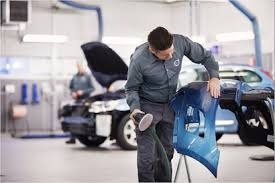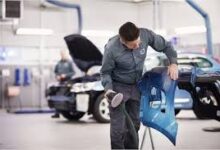Red Flags to Watch in a Collision Repair Shop

As any driver knows, red means stop. We see red on stop signs and red lights, so when you see a red flag, you should also stop and go no further. The term “red flag” is perhaps most used in the context of romance. If you’re on a date with someone and they exhibit a “red flag”, you shouldn’t see them again. This might mean speaking poorly of their ex, interrupting you, or treating a server rudely.
Auto repair shops have their own red flags. Unfortunately, the accident repair industry has developed a reputation for being less than honest with customers. Many car body shops are honest and professional, but all it takes is a few bad apples to spoil the whole bunch. So, how do you know if your local auto body shop is giving you green flags or red flags?
Why would an auto repair shop have red flags?
Collision repair businesses don’t advertise their red flags. These are often subtle hints that betray their lack of professionalism, their unscrupulousness, or their reliance on outdated tools and technology. The red flag in question might be something small and inconsequential, something you can look past. But consider this: If an auto repair shop gets a small thing wrong, what about the big things?
It’s like the story of Van Halen and the brown M&Ms. In the 1980s, the band Van Halen put a clause in their tour rider demanding that venues provide them with M&Ms, but no brown ones; those were banned. People passed this story around about how silly and excessive rock stars can be. But actually, the band did this as a test. If event staff couldn’t get something as small as avoiding brown M&Ms right, how could they be trusted with building stage sets, expensive audio equipment, and pyrotechnics?
It’s a similar story with car body shops and red flags. Sure, a small mistake on a quote isn’t necessarily a big deal on its own. But if the auto repair technician got that wrong, what else might they get wrong?
Key collision repair red flags
Here are some classic accident repair red flags you should watch out for to avoid dealing with a dishonest or incompetent auto body repair shop:
Overcharging for service
Do you know how much it costs to replace the muffler on a 2019 Hyundai Elantra? Or what’s a fair price for a brake fluid flush on a 2016 Chevy Volt? If you’re not a collision repair technician, the answer is probably “no”. But do you have access to the internet? The answer is probably “yes”.
You don’t have to instantly agree with any quote a car body shop gives you. You can say you’ll get back to them with your decision and call them in 30 minutes after doing some quick research online. If you’re at the shop in person, you can even excuse yourself for a bit searching on your phone.
You probably won’t find a definitive answer for the price of the service the collision repair tech just quoted you. But you probably can find a range. If the estimate you’ve received is well beyond that range, you can ask why. If you don’t like the answer, you can find a more reputable auto repair shop.
Lack of qualifications
If an audit body repair shop claims to be a certified shop for a certain automaker, or if technicians claim to have specific certificates, ask to see them. If they make up some sorry excuse as to why they can’t show you, that’s a red flag.
Extended repair times
This one’s a bit tricky because there are lots of things that can legitimately extend a repair time beyond the initial quote. A common situation is that a part on order doesn’t arrive in time. Supply chains are notoriously unreliable these days, so if an auto repair shop calls you and explains why the repair is taking longer and apologizes for it, that’s not necessarily a red flag. But if you have to call them, and then they give you an excuse? That’s a red flag.
Lack of communication
Similarly, if collision repair techs don’t explain the service they’re going to do, the costs involved, or how long they expect it to take, that’s a red flag. Technicians should be able to describe the repair or service they’re recommending and why it costs and what it costs. Don’t be afraid to ask as many questions as you need to feel comfortable with that particular car body shop.
No written estimate
Written communication can be just as important as oral communication. Not all collision repair shops offer written estimates as a matter of course. But if you ask for one, and they won’t give you one or take too long, that’s a red flag.
Unrequested repairs
It’s become a trope: You go into an auto body repair business for a tire rotation, and they recommend a full-body repair. Auto repair shops are notorious for upselling clients on bigger, more expensive repairs. But then, sometimes technicians legitimately find other problems when working on a vehicle.
It can be tough to tell one from the other, but the difference usually lies in clear and responsive communication. However, if the collision repair technicians just go ahead and perform a service without asking you first. That’s a major red flag. You don’t have to pay for anything you didn’t agree to.
Find an auto repair shop you can trust
When it comes to repairing your vehicle after an accident, trust is everything. Red flags like vague communication, unqualified technicians, or unexplained costs can leave you feeling uncertain—and rightfully so. That’s why it’s important to choose an auto repair shop that not only avoids these red flags but consistently delivers professionalism, transparency, and high-quality work.
CSN Collisionlocations are a great example of what a trusted repair partner should be. With a reputation built on integrity, certified technicians, and clear, upfront communication, CSN Collision shops go the extra mile to ensure you feel confident and cared for every step of the way. So, when the unexpected happens, you can rest easy knowing that CSN Collision has your back, with no red flags in sight. Outreach on Seo





